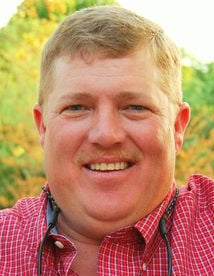Source: roanoke.com

Del. Matt Fariss
Del. Matt Fariss, R-Campbell County, has signed on as chief co-patron of a bill to legalize industrial hemp production in Virginia — a bill filed by New River Valley Del. Joseph Yost.
Fariss, a farmer, said hemp could be an asset for growers searching for new crops to cultivate.
“I think hemp is a very valuable agricultural product for Southside Virginia,” he said. “It doesn’t have any negative impacts, like marijuana. It’s an industrial product with many industrial applications.”
Hemp has a long history of use in the United States — in the 1600s, Virginia farmers were required to grow it — but its production was banned in the 1970s.
Hemp products, ranging from paper to oil to building materials, are legal but the material must be imported from Canada, China and elsewhere.
House Bill 1277, introduced by Yost, R-Pearisburg, seeks to take advantage of a new federal provision allowing states to set up pilot programs to grow hemp and research its potential as a commercial product. Former Montgomery County Board of Supervisors member Jim Politis has championed the need for the legislation for years.
To date, 19 states have put laws on the books authorizing hemp production, according to the National Conference of State Legislatures.
Hemp initially was outlawed due to association with its fellow cannabis variant marijuana. But advocates stress the two are distinct.
Tetrahydrocannabinol (THC) — the active ingredient in marijuana — is present in only trace amounts of 0.3 percent or less in hemp. In marijuana, it can push into the double digits.
Nelson County farmer Jerry Thornton, a vocal supporter of industrial hemp, said allowing production would throw a lifeline to farmers grasping for new revenue sources.
“Industrial hemp is, more or less, just another standard crop, but it has the potential to become a big commodity down the road,” said Thornton, a part-time farmer who inherited about 400 acres in the Roseland area.
“I see this as a way to support my farm and keep it active and alive without having to sell it off,” he said. “I really want people to see it from that perspective, from someone in my position.”
Industrial hemp is easy to grow, has a multitude of uses and offers economic benefits that will ripple past the farm by supporting processing plants and related industries, Thornton said.
“It should be pretty cut and dry,” he said. “There’s really nothing wrong with it.”
HB1277 would require hemp producers be licensed and regulated by the state. The Virginia Sheriffs’ Association requested one inspection provision be tightened up, but otherwise offered no objections to the bill.
“As long as it’s for industrial use and is closely monitored,” said John Jones, executive director of the law enforcement association. “… It may be a help to the economy. We don’t view it as an issue that we want to oppose.”
The regulations should include an option for law enforcement to inspect the growing area, Jones added. The current version of the bill offers that, but requires authorities to give 48-hours warning of any inspections.
The sheriffs association requested that caveat be stricken, Jones said. It has raised the issue with Yost, the bill’s chief patron, and believes it will be changed.
HB1277 will be considered in the 2015 General Assembly session that convenes Jan. 14. In addition to Yost and Fariss, it has five other co-patrons. In all, three Republicans and four Democrats have lent their names to the bill.
Fariss, who grows corn and raises cattle, predicted the biggest challenge to starting up hemp production in Virginia would not be getting it legalized — but developing a market for it.
“But we’ll never get a market for it while it’s illegal to grow in the state of Virginia,” he added. “… This is a step in that right direction.”
No comments:
Post a Comment